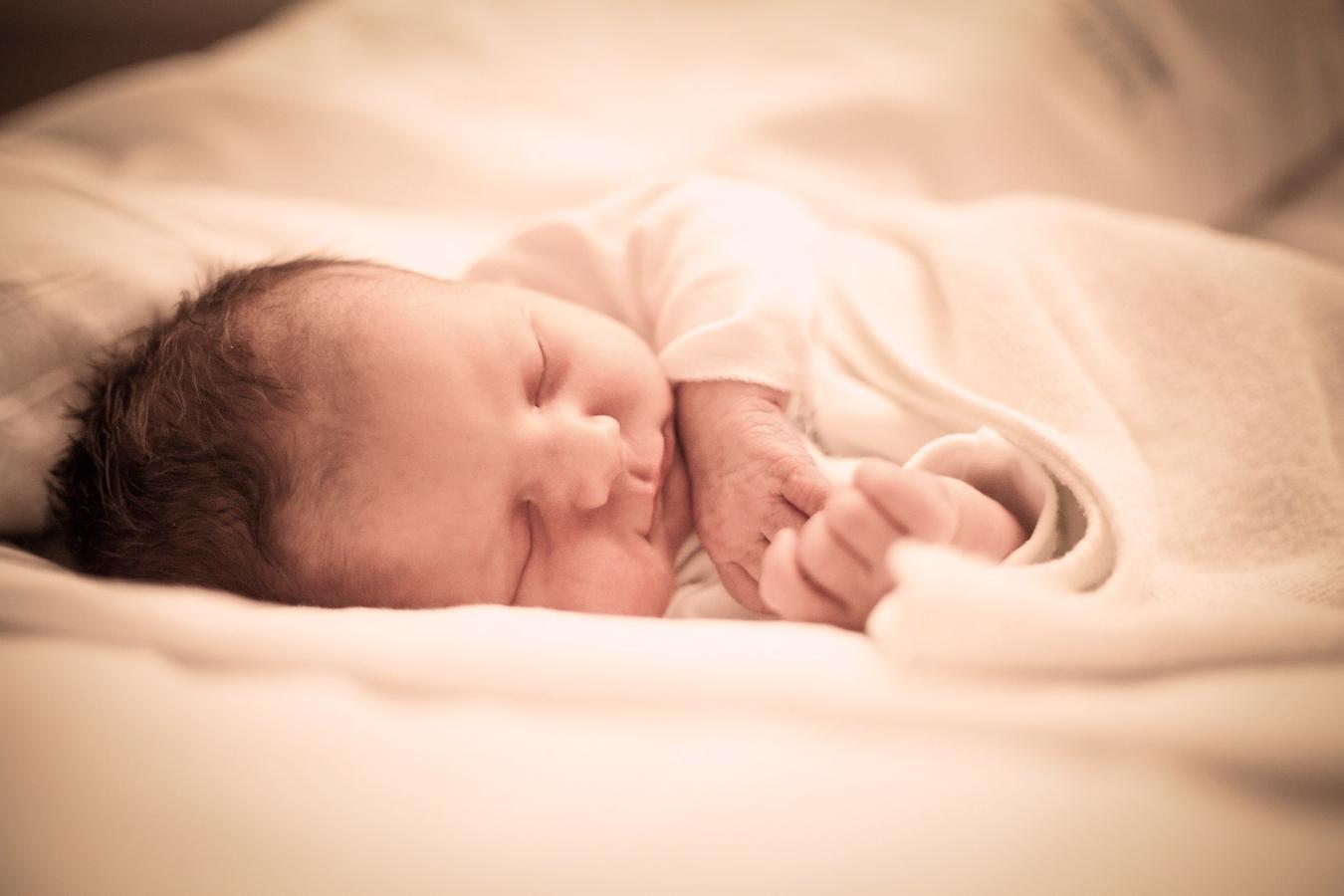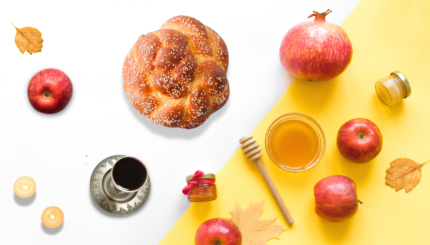It’s a girl!
Now what?
While Jewish tradition is clear about the ceremony for welcoming a baby boy, there is no set ritual for welcoming a baby girl. In more traditional communities, the father of the baby takes an aliyah to the Torah on the first Torah-reading day after the birth. A misheberakh (prayer for well-being) is recited for the mother and the child, and the baby girl receives her name. Often the rabbi or parents speak about the name.
In more progressive communities, this naming might occur on a Shabbat during the first few months of the baby’s life, and the mother, and other family members, might receive an aliyah as well.
With your help, My Jewish Learning can provide endless opportunities for learning, connection and discovery.
Beyond these basics of naming a daughter, many families are also developing new rituals that, much like a baby boy’s circumcision, symbolize their daughters’ entry into the Jewish covenant.
Rituals Involving Water: The most common of these new rituals involve water–either dipping the baby’s feet or other body parts into water, often a mikveh, or pouring water over her feet. Other families choose to fully immerse the baby girl (one should check with a pediatrician before doing so). These rituals are sometimes called Brit Mikveh (covenant of the ritual bath) or Brit Rehitzah (covenant of washing).
At a Women’s Rabbinical Alliance Conference in the early 1980s, nine progressive women rabbis developed the idea of a washing ritual for daughters, and they hoped families would adapt it to meet their own needs. Rabbi Bradley Shavit Artson, dean of the Ziegler School of Rabbinic Studies, likes to recommend a feet-washing ritual for reasons both spiritual and practical: the ritual evokes biblical imagery, it is performed on the baby girl’s body, and it can take place even if the baby is crying, he explains.
Water rituals are meaningful and symbolic in a number of ways.
Covenant: Rain water–and especially rainbows–recall God’s covenant with all of humanity, which followed the biblical story of Noah and the flood. In Exodus, the splitting of the Red Sea is a powerful water scene which leads the Israelites to freedom and the start of a new, covenantal life. The Meiri, a 13th century French commentator, spells out the water-as-covenant connection, when he writes that the forefathers entered into the covenant with God through circumcision, and the foremothers entered this covenant through immersion in the mikveh (see comments to Yevamot 46a-b).
Creation / New Beginnings: Water holds powerful symbolism as the source of life. It figures prominently in the creation story in Genesis, when it is separated first from the heavens and then from the land to initiate the creation of all living things, and is an appropriate medium for celebrating new life.
Feminine Connection: Biblical women have a special connection to water. Sarah brings water to the three guests who visit her and Abraham in the desert, Rebecca is found at a well while giving water to both people and animals, and Miriam is associated with wells. Rabbinic Judaism legislates monthly visits to the mikveh for married women, strengthening the women and water connection.
Immersion: Besides sitting in a sukkah, mikveh is the only mitzvah whose observance fully surrounds those observing it. For babies, immersion mimics the safe and protective environment of the womb from which they emerged.
Welcoming: In the Bible, Abraham washes the feet of the three guests who visit him in the desert as a welcoming gesture (Genesis 18:1-4). Parents can wash the feet of their newborn daughter to welcome her to the world and to the Jewish community.
Rituals that Parallel the Wedding Ceremony
Some parents circle their baby daughter seven times to symbolically bring her into the covenant. This mimics the traditional practice at a wedding ceremony, when the bride circles the groom seven times as they join together in covenant with God.

Anita Diamant, author of The New Jewish Baby Book, and a pioneer in innovative Jewish ritual, explains that elements of the Jewish wedding ceremony can be resonant at a welcoming ritual for a daughter, since both life events are about creating a covenant, and both mark a new beginning for a family. She outlines a number of ways to incorporate wedding liturgy and imagery into welcoming ceremonies for daughters, and more ideas can also be found at ritualwell.org and Itim.
For example, families may recite seven blessings to welcome their daughter, parallel to the seven blessings (sheva berakhot) which sanctify a Jewish wedding. These birth ritual blessings often include the blessing over wine and the sheheheyanu blessing, and sometimes more innovative blessings created by the family for the moment. For example, some parents modify the wedding blessing over “the One who causes bride and groom to rejoice together,” changing the language to bless “the One who causes parents and children to rejoice together.” Since six of the seven blessings in the Jewish wedding ceremony focus on creation, they are relevant when welcoming a child–a time that the power and importance of creation are particularly apparent.
Also, in keeping with the wedding theme, some parents hold their daughter’s welcoming ceremony under the huppah (marriage canopy) that they used at their own wedding.
Other Rituals
Parents have developed many other rituals that speak to their own personal connection with Judaism. This includes wrapping the baby in a family tallit or touching a klaf (sacred scroll, often a mezuzah scroll) to the baby’s lips. Some families use the various senses to welcome their daughters,–touching wine to the baby’s lips, and having her smell spices or herbs.
Other families anoint their daughter with gentle oil, which evokes the biblical practice of anointing kings and priests (Samuel I, 15:13). Anointing a baby can represent a blessing for plenty, in keeping with the verse from Ecclesiastes, “Let your clothes always be freshly washed and your head never lacking ointment” (9:8), and the famous Psalm 23, “You anoint my head with oil, my drink is abundant” (23:5). Anointing is also associated with love in Song of Songs, “Your ointments yield a sweet fragrance, your name is like finest oil, therefore do maidens love you” (1:3).
Some ceremonies are not for the faint of heart. In one recently-developed ceremony on ritualwell (link), a mother dabs her newborn daughter with lochial blood on the fifteenth day after birth. According to the Torah, on the fifteenth day after the birth of a baby girl the mother’s post-partum bleeding ceases to be ritually impure (Leviticus 12:5). After the birth of a son, the mother’s blood becomes pure on the eighth day, in time for a brit milah (Leviticus 12:2). Lochial blood from the fifteenth day after the birth, therefore, symbolizes a daughter’s entry into the covenant, like a circumcision would for a son.
All of these rituals can include the baby’s older siblings, extended family members, and friends, who can–help wrap the baby in a tallit, help wash the baby; circle the baby, or recite a blessing, poem, or reading.
aliyah
Pronounced: a-LEE-yuh for synagogue use, ah-lee-YAH for immigration to Israel, Origin: Hebrew, literally, "to go up." This can mean the honor of saying a blessing before and after the Torah reading during a worship service, or immigrating to Israel.
brit milah
Pronounced: breet mee-LAH, Origin: Hebrew, literally "covenant of circumcision," the Jewish circumcision ceremony for an 8-day-old boy, marking the covenant between God and the Jews. Also known as a bris.
mezuzah
Pronounced: muh-ZOO-zuh (oo as in book), Origin: Hebrew, a small box placed on the right doorpost of Jewish homes. It contains a parchment scroll with verses from the Torah inscribed on it, including the Shema prayer (Deuteronomy 6:4-9, 11:13-21).
mikveh
Pronounced: MICK-vuh, or mick-VAH, Alternate Spelling: mikvah, Origin: Hebrew, Jewish ritual bath.
mitzvah
Pronounced: MITZ-vuh or meetz-VAH, Origin: Hebrew, commandment, also used to mean good deed.
Shabbat
Pronounced: shuh-BAHT or shah-BAHT, Origin: Hebrew, the Sabbath, from sundown Friday to sundown Saturday.
Torah
Pronunced: TORE-uh, Origin: Hebrew, the Five Books of Moses.



